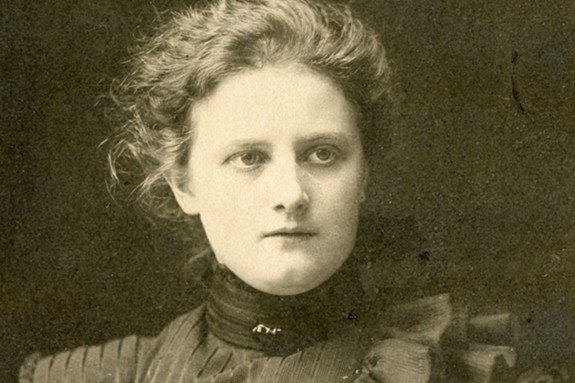“I will remain in Samara as long as the prisoners are here or passing by”
Anna Linder volunteered in Russia from 1915 to 1920. She and 76 other delegates were sent by the Swedish Red Cross together with over 1 000 boxcars of relief goods. This letter is a compilation drawn from Anna’s notes in Per Allan Olsson’s book “Krigets fångar och änglar” (Prisoners and Angels of War), published in 2018.

Samara, Russia, March 1918
My dear pastor Larsson,
Recently, one cold and snowy afternoon, a large group of prisoners who had joined the Bolshevik cause, showed up in front of our storehouse in Samara (This is the city on the east banks of Volga, where I spent most of my time in Russia as a delegate for the Swedish Red Cross). At the head of the group were several of the Hungarians from the Revolutionary Committee, commanded by a stocky Magyar that I’d seen around before. He had a Cossack sabre strapped to his Russian fur cost – and a grim look on his face. They wanted to take charge of the stock, he declared.
I simply stated that all clothes, shoes and blankets in the storehouse were meant for their sick comrades in the camp and would remain so. Breaking in would be over my dead body, I explained a bit more harshly - making clear that I had as little fear of death as Charles XII, if they might have heard of our heroic Swedish king…
We were lucky this time. Eventually, they dropped off – and very early, the next day, we quickly brought all items to the camp on sledges. Now the store is empty again and I have sent word to the Petrograd office, requesting more clothes and more of the Liebesgaben, the packages with daily necessities that are so cherished by the prisoners.
”The death rate was frightening”
You remember I mentioned the word Totskoje in my previous letter – the prisoners that were tucked into an endless row of Cossack barracks on a god-forsaken, desolate, barren stretch of land, a day’s journey eastward from Samara. When I arrived in early 1916, a devastating outbreak of diseases, typhus above all, had ravaged through the camp. The death rate was frightening. 17 000 out of 25 000 prisoners had died in less than one and a half year!
Honestly, I can say that we managed to improve things step by step. Separated the sick from the healthy, organized a hospital care, clean water, additional food for the weakest. Not to mention the prisoners´ workshops, a whole sprawling industry of making rings, bracelets, clock-chains, picture frames, shoes… every trip back to Samara we had trappings and things to sell at the local flee market that brought rubles back to the camp. Especially the brooms and brushes are popular. In Totskoje every horse tread around without crests and tail!
When I arrived here in Samara, I also traveled round to assess the situation in the other camps. The need seemed endless, up and down and on both sides of the Volga. In Syzran for instance, there were 2 500 men waiting our arrival, in Stavropol the same, in Bugulma 3 000, in Buguruslan 3 500. Many men in those camps were dressed in the same accoutrement, the very same uniform - or rather the tattered remains of it – they had on when they first were captured at the frontline. Some had nothing to wrap around themselves when they laid down to sleep.
”Now I am once again impatiently waiting for the next train with blankets and clothes”
When I got back from this trip, I was truly upset. I wrote in German, Die Mannschaft schläft auf nakten Pritschen, welche voll Wahnsinn ist! Naked, on planks! You should have seen my ghastly handwriting! Anyway, this report was forwarded by Petrograd to Stockholm and onwards to Berlin and Vienna, and I believe they slowly began to fathom what predicament we and their citizens faced if they didn’t hurry up with the aid!
Now I am once again impatiently waiting for the next train with blankets and clothes. And the next one. And the next one!
Otherwise, Samara is really the perfect location for reaching out to the many camps and prisoners in the governorate. Here, I have also found the most perfect locality for our office. The address is Samarskaja 17, a neat, redbrick building not far from the centre of the town. A brisk walk will take me to the nice Swedish Red Cross hospital we have established for the prisoners. It is located at Predtetchenskaja 1, the last building on a steep downhill street, facing the beautiful Volga river. I must admit, this is our eyestone, our most cherished hospital. All beds have been constructed by prisoners themselves from the wooden boxes that carried their clothes. The nurses almost beam with satisfaction in their neat blue dresses and white aprons.
Just the other day I heard an Austrian patient bless the clean bed he was given and thank God that he could die “as a human being”. Others recover so quickly that they immediately start to believe in peace and a return to home! Friede, they shout. Bald zurück im Heimat! Everybody smiles and it eases the pain.
Now I must stop writing. I just got words that a train packed with prisoners from the terrible work at the Murman railway has arrived. It is not the first one. They will all be suffering from scurvy.
My dear friend and colleague Elsa Brändström once asked me to come to Moscow to take charge of our hospital care there. But you know how pig-headed I am! I will remain in Samara so long as the prisoners are here or passing by.
Perhaps something from my letter could serve as a collect for the Swedish Red Cross committee for the prisoners of war.
God’s peace,
Anna
Anna Linder
Swedish Red Cross
